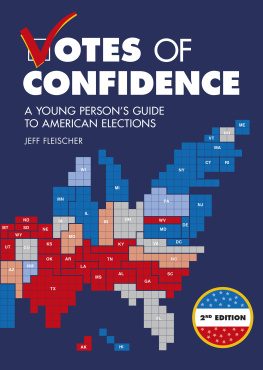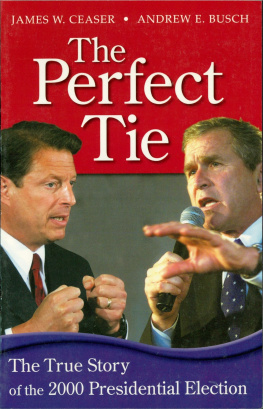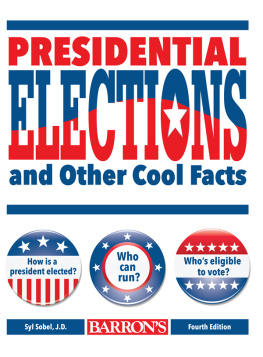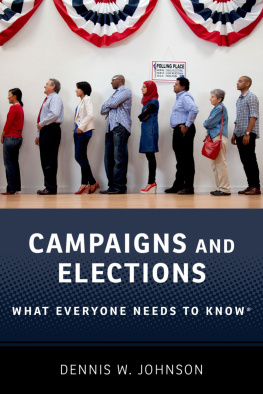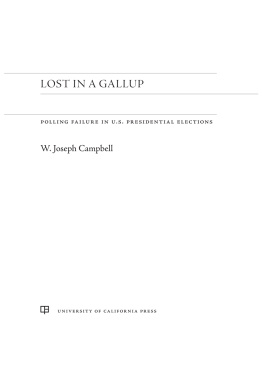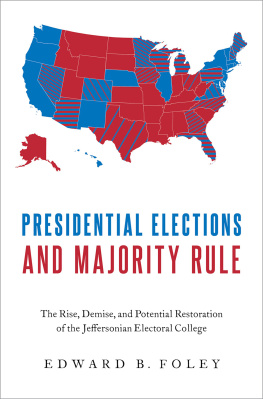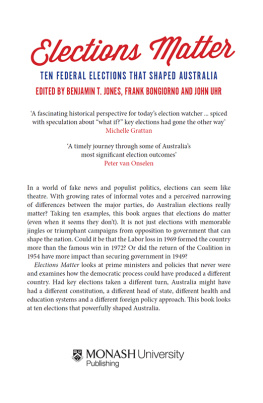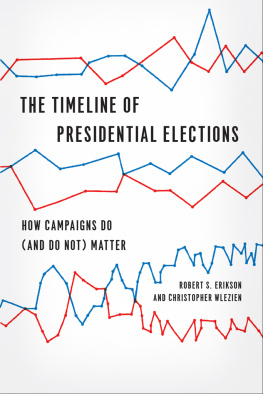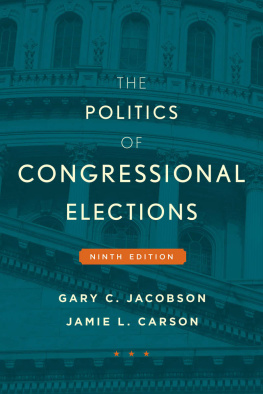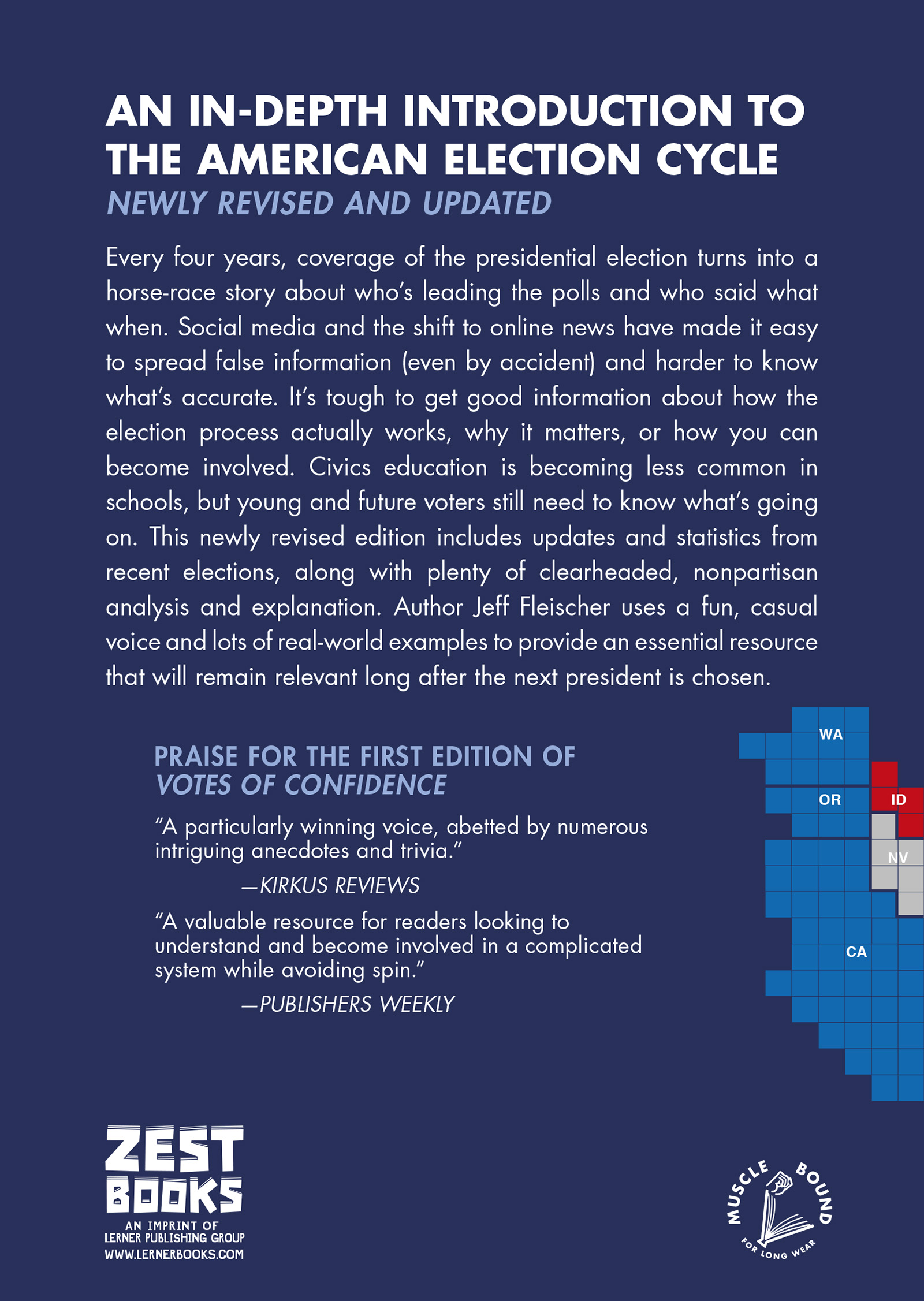Text copyright 2020 by Jeff Fleischer
All rights reserved. No part of this book may be reproduced, stored in a retrieval system, or transmitted in any form or by any meanselectronic, mechanical, photocopying, recording, or otherwisewithout the prior written permission of Lerner Publishing Group, Inc., except for the inclusion of brief quotations in an acknowledged review.
Zest Books
An imprint of Lerner Publishing Group, Inc.
241 First Avenue North
Minneapolis, MN 55401 USA
For reading levels and more information, look up this title at www.lernerbooks.com .
Visit us at zestbooks.net .
Main body text set in Adobe Caslon Pro.
Typeface provided by Adobe Systems.
Library of Congress Cataloging-in-Publication Data
Names: Fleischer, Jeff author.
Title: Votes of confidence: a young persons guide to American elections / by Jeff Fleischer.
Description: Second Edition, Updated Edition. | Minneapolis: Zest Books, [2020] | Audience: Ages: 1118. | Audience: Grades: 9 to 12. | Previous edition published: San Francisco, California: Zest Books, [2016] under title Votes of Confidence. | Includes bibliographical references. | Identifiers: LCCN 2019013046 (print) | LCCN 2019014186 (ebook) | ISBN 9781541583887 (eb pdf) | ISBN 9781541578968 (library binding : alk. paper) | ISBN 9781541578975 (paperback : alk. paper) | ISBN 9781541583887 (eb pdf)
Subjects: LCSH: ElectionsUnited StatesJuvenile literature. | Representative government and representationUnited States.
Classification: LCC JK1978 (ebook) | LCC JK1978 .F55 2020 (print) | DDC 324.60973dc23
LC record available at https://lccn.loc.gov/2019013046
Manufactured in the United States of America
1-47087-47887-8/27/2019
Contents
Introduction
W hen I wrote the first edition of Votes of Confidence in 2015, my goal was to create a handy primer for young voters about politics and elections, and one that could also serve as a refresher for older readers. By the time the book showed up in stores in May of 2016, the United States was in the middle of one of the craziest election cycles in the countrys history.
The 2016 race featured a perfect storm of unusual circumstances. When Barack Obama won the presidency in 2008, it was the first time in more than five decades that neither the Democrats nor the Republicans had a sitting president or vice president running; just eight years later, the same thing happened. (Vice President Joe Biden would have been an obvious candidate, but he chose not to run after the untimely death of his son Beau.) The Democratic primaries ended with Hillary Clinton becoming the first woman to win a major American partys presidential nomination, after a close race against longtime independent Senator Bernie Sanders of Vermont, who fared particularly well among young voters. The Republican process saw more than a dozen governors and senators from across the country, and the most diverse group of candidates in GOP history, lose to Donald Trump, a business and TV celebrity who became the first president without either government or military experience, and who routinely used false information and conspiracy theories against both his Republican and Democratic opponents.
The country was therefore treated to the odd spectacle of a race to replace a still-young and popular president that featured two candidates a generation older and significantly less popular than him. The outcome was also bizarre, as the Democratic nominee won the nationwide popular vote for the sixth time in the past seven elections dating back to 1992... but, because of the electoral vote, lost the election. About three million more voters backed Clinton, but a margin of fewer than one hundred thousand votes spread across three traditionally Democratic states meant that didnt matter.
Plenty of other factors led to an election that history classes will study for a long time.
The government of Russia carried out successful and unprecedented cyberattacks against the US election: hacking the Democratic National Committees e-mail and leaking the contents; spreading fake news stories to millions of Americans through social media channels; attempting to hack voting systems in at least thirty-nine states; and collaborating with members of the Trump campaign, several of whom pled guilty and went to jail (an investigation is ongoing as of this writing).
Thats not all. Third parties gained more than six million votes, many from disaffected Republicans and Democrats. Key Republican leaders, including 2012 nominee Mitt Romney and both Presidents George Bush, skipped their partys convention and publicly came out against Trump, who took office with the lowest approval ratings, and easily the highest disapproval ratings, since that statistic came into use in the 1940s. (At the time, Gallup polls found 63 percent of Americans had a positive view of Obama. On the other hand, 52 percent held a negative view of Clinton, and an all-time high of 61 percent had a negative view of Trump.) Several states, including Wisconsin and North Carolina, passed laws to prevent some of their citizens from voting, impacting the presidential election and other races. There isnt enough room in the pages of this book to analyze all the factors that made 2016 go down the way it did.
Because 2016 was anything but a typical year, it led many Americans to want to learn more about government and elections. All year, on social media and in person, I regularly had strangers ask me all kinds of questions about the process and why certain things were happening. If theres a silver lining to all the craziness of that election (and its even crazier aftermath), its that it inspired more Americans to get involved, whether that meant the massive protests that followed the inauguration, the fact that many more voters took part in the 2017 off-year elections and 2018 midterms than participated in those same cycles four years earlier, or the founding of groups urging scientists, women, or young people to become candidates for office (voters elected a record 102 women to Congress in 2018). While it is important not to normalize a presidential administration that has routinely attacked US institutions and traditions that both major parties long supported, citizens who paid attention saw some of the systems built-in checks and balances at work.
That said, if there was one line from the first edition of Votes of Confidence that showed up most often in reviews of the book, it was: If theres one thing we know for sure about American government, its that a lot of Americans dont know much about it.
That remains a real problem.
A September 2017 survey by the Annenberg Public Policy Center at the University of Pennsylvania found that 37 percent of Americans couldnt name any of the rights guaranteed by the First Amendment to the Constitution, and none of those rights could be identified by a majority. The same poll found only 26 percent could identify the three branches of governmenta drop from 36 percent in 2014and 33 percent could not name a single branch.
In a famous 2011 survey, Newsweek magazine figured it would test whether one thousand natural-born US citizens could pass the same citizenship test that immigrants need to take before becoming naturalized. Only 62 percent managed to pass the test. Only 37 percent of the test takers knew how many justices sit on the Supreme Court. Only two-thirds knew when the Declaration of Independence was signed, and 29 percent did not know the identity of the current vice president. (In case you were wondering: nine, 1776 and, at the time, Joe Biden.)

